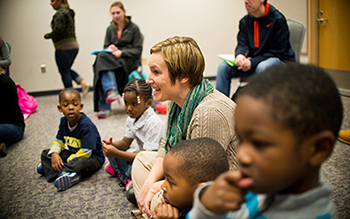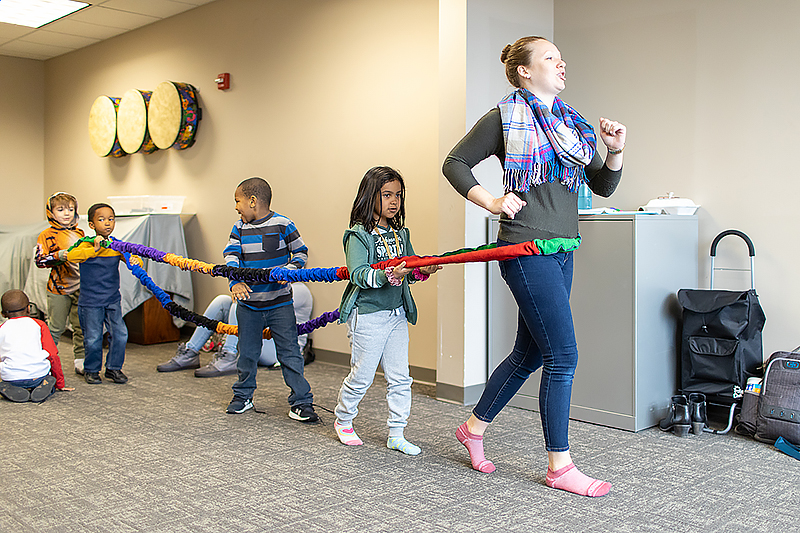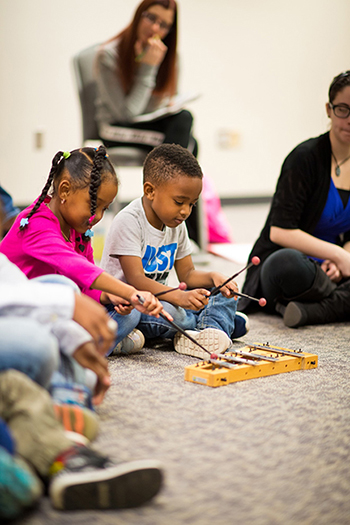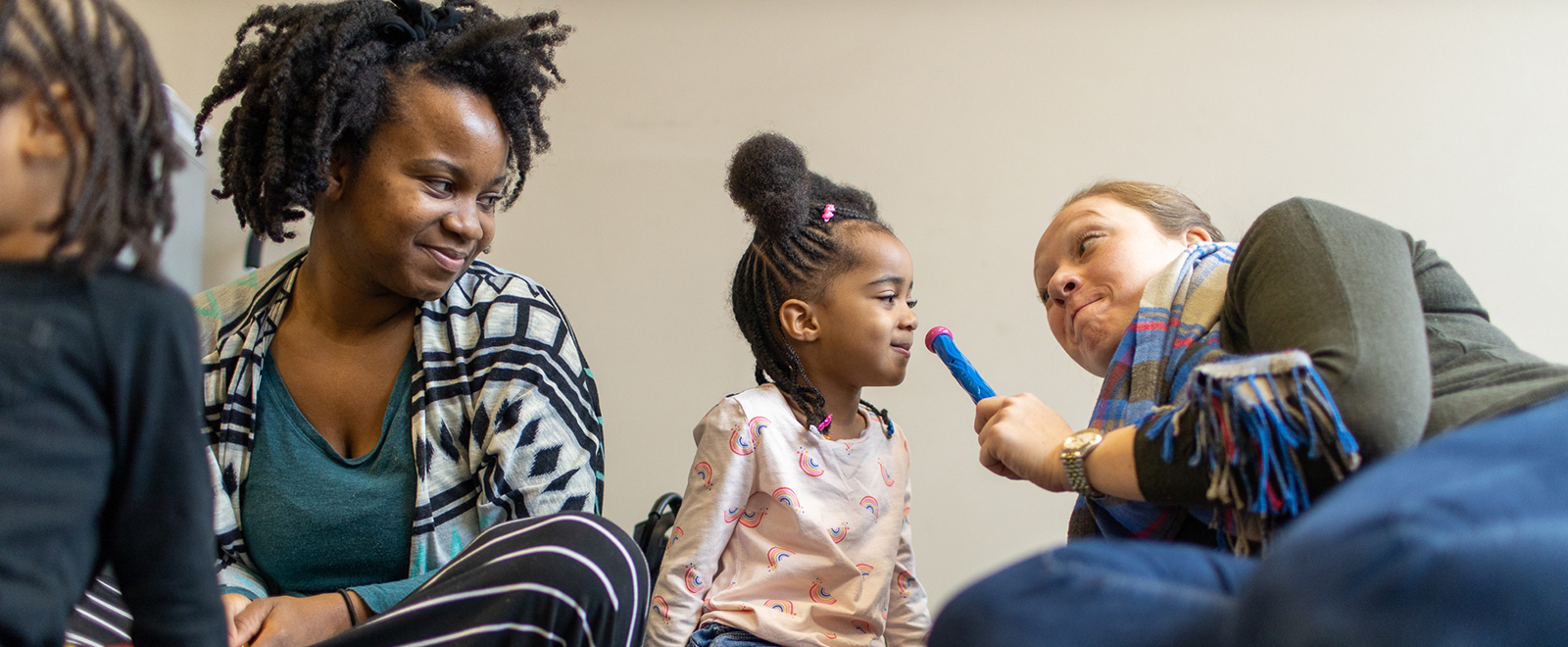In a classroom filled with toddlers and their caregivers, a teacher sings as the children bounce colorful scarves in their hands. At the end of the song, everyone throws their scarves in the air, tracing their path with their voices “Woooooo!” and watching them as they drift to the floor. A three-year-old boy walks over to the teacher and touches his fingers to each other in front of him. Recognizing this as the American Sign Language sign for “more,” the teacher says, “Cory, do you want to do that more?” and signs back before restarting the song. This is the first time that Cory, who is autistic and does not speak, has used a sign that has shared meaning for him and the people around him.
This true and touching moment illustrates one of many powerful benefits that early childhood music education can have for children and caregivers. Michigan State University Associate Professor and Chair of the Music Education Area Karen Salvador explains that early childhood music has been a strength of MSU’s Music Education program since it was implemented by her mentor, retired Professor of Music Education Cynthia Taggart.
With much potential for growth, Salvador is working to take the program to a new level by repositioning it as the Early Childhood Music Play Laboratory. The new name reflects an ongoing research-based focus on children ages birth to seven. Between the East Lansing and Detroit locations of MSU Community Music Schools (MSU-CMS), the Early Childhood Music Play Laboratory offers about fifty classes per week, making it among the largest programs in the country.

Karen Salvador is working to take MSU’s early childhood music education program to a new level by repositioning it as the Early Childhood Music Play Laboratory. The new name reflects an ongoing research-based focus on music learning and the power of musical interactions for children ages birth to seven.
“Everything we do is research based, and the pedagogical methods that we use are developmentally appropriate. Music classes are producing awesome little miracles every day,” Salvador said. “I don’t know how else to put it. There’s a magic that happens when you’re doing music with very young children that gets their creativity, physicality, and communication going.”
In addition to offering tuition-based classes at both MSU-CMS locations, Salvador explains that the program has partner organizations for grant-supported outreach classes. Outreach programs in the Lansing area include outdoor music classes as well as partnerships at the Capital Area District Library and Early Head Start. In Detroit, the Early Childhood Music Education Play Laboratory partners with dozens of organizations, including Brilliant Detroit, Head Start, Detroit Public Schools Community District, and Alternatives for Girls.
“Our programs are inclusive settings where kids and families with a variety of needs thrive,” said Salvador. “I think one of the things I enjoy about working with very young kids is that they all have needs, whether or not they are diagnosed with any particular challenges. They all are working to control their bodies. They’re all working to regulate their emotions and communicate.”
Currently at MSU-CMS, sixteen undergraduate interns are assisting in courses, learning how to teach the birth to seven population using research-based methods. Next semester, those who want to can be assistants in classes for pay and take increasing responsibility for those classes. Later, they can apply to be a lead teacher. There are three undergraduate lead teachers working in the program right now.

Wanda and Ed Eichler, left, visited the Community Music School in East Lansing for a first-hand look at the early childhood classes. They met with, from left, Music Education Chair Karen Salvador, research fellow Namhee Lim, and teacher and MSU music education alum Kate Port.
A nationwide shortage of music educators – particularly those who know how to work with children younger than the age of 8 – has been an issue for years. Increasing the number of teachers skilled in best practices is the goal, and Salvador was looking for help with research and opportunities to work with graduate students interested in learning to teach future early childhood educators. That is when long-time College of Music donors Wanda and Ed Eichler stepped in.
In addition to their contributions to the College of Music – which include major gifts for the Billman Music Pavilion addition and the building of the Red Cedar Organ in the MSU Alumni Memorial Chapel – Wanda and Ed are members of the College’s National Leadership Council. Salvador spoke to the council about the Early Childhood Music Play Laboratory, and shortly afterward the Eichlers made a new gift in honor of Wanda’s mother to create the Val’s Kids Fund for Early Childhood Music Education.
Wanda’s mother, Vallanee Luedtke Hayes, grew up in Wisconsin and graduated from the University of Wisconsin-Madison in 1943. A mother to seven children and a strong advocate of early childhood education, Val (as she was known to her family and friends) was deeply committed to children and devoted her career to them.
“We heard about Karen’s need and were impressed with the vision that research could change attitudes toward teaching music to really young children,” Wanda Eichler said. “My mother worked in early childhood programs for over 20 years after raising the seven of us. It seemed natural to honor my mom and support the search for documentation to back up what teachers, the majority of them women, have been saying for decades — music touches little kids in astounding ways.”

Christie Lower is a program manager for early childhood music education at the MSU Community Music School in Detroit. Her enthusiasm for her work keeps the children engaged and allows researchers to study the methods she puts into practice.
After learning about the Eichler gift, Salvador received an unexpected response to her advertisement for doctoral students. An experienced researcher named Namhee Lim from the University of Louisville contacted her to ask if MSU could hire a research fellow instead of a doctoral student. Salvador asked the Eichlers what they thought.
“The Eichlers are so generous, and they trust me to use the funds in ways that make sense to me,” Salvador explained. “So, I hired Dr. Lim for a year to work together on these research projects.”

Associate Professor and Chair of MSU Music Education Karen Salvador describes the university’s early childhood programs as “inclusive settings where kids and families with a variety of needs thrive.”
While the Val’s Kids fund does not directly impact the sixteen undergraduate interns preparing for early childhood music teaching careers, its positive influence on the early childhood program is benefiting all involved and has the potential to influence practices on a larger scale.
“Graduate students work with me and our undergraduate intern teachers in early childhood classes, and the hope is that the graduate students will start an early childhood music program like this when they finish their degrees and start teaching at a university,” Salvador said. “At the same time, Dr. Lim is participating in early childhood music classes because she wants to see how we do it. She is helping with this important research and will leave here with additional ideas about developmentally appropriate music practices.”
In short, through Val’s Kids, the Eichlers are supporting research capacity, and with the music play lab, giving Salvador the help she needs. In addition to funding to support Dr. Lim’s work, Val’s Kids is also allowing Salvador to install video cameras in the early childhood room in East Lansing, purchase iPads for video recording in Detroit, and next year hire a Ph.D. student to closely collaborate on the research she starts.
“Karen delved into the project right from the get-go. Ed and I are excited to see the adaptability in the study,” Wanda said. “As a researcher works, they pivot and develop approaches they did not see at the onset. We like the flexibility and imagination in Karen’s work.”
Over time, Salvador explains, Val’s Kids will help MSU develop educators who understand how to teach with developmentally appropriate practices for children ages birth to seven. A recent meeting with the Eichlers at the Community Music School in East Lansing reinforced Salvador’s good feeling about the partnership with the Eichlers.
“What I really loved about that interaction with Wanda and Ed was how they still have a learner mindset. They were asking thoughtful questions about what they saw. When they were observing the children, they were so absorbed in what they were seeing. I enjoyed that about them tremendously,” Salvador said. “They are supportive, interested, and dedicated to improving kids’ lives.”
The same can be said for Salvador and the entire MSU Early Childhood Music Play Laboratory students and faculty.

The Campaign for Michigan State University
Our campaign addresses the most pressing challenges facing the music industry today while increasing our capacity to create lasting positive change and to support student and faculty success.
See Our Campaign Goals







